Lives of
Great
Purpose
2021
Awards
The Lives of Great Purpose Award was created in 2018 to exemplify Harley graduates who demonstrate dedication, perseverance, commitment, and vision in their life’s work in order to make a positive and significant contribution to humanity.
While we believe all Harley alumni go on to lead successful and fulfilling lives, the Lives of Great Purpose Award is a special tribute to graduates who are going above and beyond, whether in their career accomplishments, volunteerism, or other personal endeavors. Nominated by family or friends, the good work of our nominees is noticed by others. After all the nominations are submitted, the Harley Alumni Recognition Committee goes through the candidates’ materials and the discussion begins. It’s a tough job because the nominees are always so strong.
We are proud to share the 2021 winners of the Harley Alumni Lives of Great Purpose Award.
Our winners were chosen by the 2021 Harley Alumni Recognition Committee:
Alex DeSantis, P ’84
(Upper School English, 1971 to 2009)
Doug Gilbert ’87, P ’21, ’24, ’27
(Middle School History, 1999 to Present)
Kate Turner Jacus ’92, P ’30
Michael Lasser, P ’77, ’80
(Upper School English, 1966 to 1998)
Karen Saludo, P ’27
Tim Wiest ’76
Willie Jackson ’77
Willie Jackson ’77
This year’s Lives of Great Purpose award winner is Willie Jackson ’77. Willie was nominated by fellow alumnus, Tim Wiest ’76. Willie and Tim have not been in contact since their days at The Harley School together, but Tim became aware of Willie’s work as a 25-year veteran of the Rochester City Fire Department and his recent retirement as fire chief—and had to share his great accomplishments.
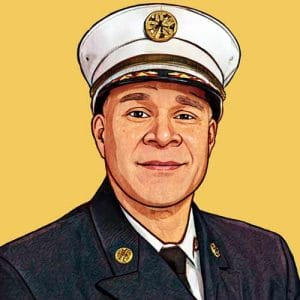
Willie, a Rochester city resident, had never really considered Harley, but a family friend who was a teacher in the city school district saw potential in Willie and told his parents, “Don’t waste his brain in the city schools” and soon thereafter, Willie was at Harley taking an admissions test. While the idea of Harley was intriguing, Willie didn’t want to leave his friends. His parents pushed him to take advantage of the chance to attend Harley and, eventually, he did. He has no regrets about his decision and says going to Harley was the best thing to ever happen to him. It changed his life.
He calls his time at Harley the “Harley Experience,” because it was so much more than an education. He recalls everyone being so relaxed, so friendly, everyone wanted to get to know each other. He had come from a nondescript school environment, and everything at Harley seemed so inspired and alive. At his old school, he had a bubble of friends that he hung out with, but at Harley, starting in Grade 8, he knew teachers, students, and families from all grade levels, and that was nice. On top of the stellar education, he had the opportunity to be a three-sport athlete, and with Harley’s strong commitment to community, was able to forge relationships with teachers and staff. It was a totally different experience than he was used to. He says compared to his old school, Harley was socially, economically, ethnically, and racially diverse. Everyone got along, and he never saw any disrespect. He said that differences were embraced and appreciated. He carries this lesson with him today.
Another instilled lesson that he references often in his daily life is from Michael Lasser, Upper School English teacher. Mr. Lasser once spoke in class about how to effectively communicate with someone,“Communication isn’t about using big words, but making it as simple as possible.” Willie learned that in order to get your message across, you should speak in plain language and avoid jargon that will confuse people.
As a firefighter, Willie had to give a lot of talks on fire prevention, and he might be speaking to a group of little children in a classroom, to a group in a retirement community, and everyone in between. Because of what Mr. Lasser said, he was able to speak clearly and simply to the various groups.
Although Willie’s father was the first African American firefighter hired by the Rochester City Fire Department, Willie did not have any plan to serve his community in that capacity. After Harley, he went to Bucknell University to major in engineering, and he hated it. The environment was just too uninspiring and drastically different from what he was used to. He came home for the summer and vowed not to go back. After arguing with his parents, he ended up staying in Rochester and going to Monroe Community College, Finger Lakes Community College, and SUNY Brockport. He took classes here and there, but he didn’t know what he wanted to do. At one point, someone asked him if he’d considered taking the firefighters’ exam. With no real direction, he decided to take the exam, although the process of becoming a firefighter was lengthy. In the meantime, he met an owner of a photography studio and got a job as a purchasing agent. He worked there for several years and was looking to move to another purchasing position at the MGM in Las Vegas. He applied for the job and was arranging a flight out for an interview when he received the callback from the firefighter recruitment class. He thought about the position he was applying for, a desk job, and then considered the characteristics of being a firefighter: helping people, on his feet, no desk required, and he made the decision to call off the interview and pursue the next steps in becoming a firefighter.
Willie shares he has a real passion for firefighting. He says at the end of his work day, he could look back and know that he made someone’s life better that day. Together with the hardworking people of the fire department, he was making positive changes in their community. For young people, being a firefighter can really be a life-changing career choice. Willie worked to promote firefighting as a career to young people throughout his time on the job.
Last year’s shutdown forced some changes in the department. Willie says only five percent of the work that firefighters do is putting out fires. He says much of their time is emergency response, water rescue, and public outreach. During the early days of the pandemic, they had to change a lot of protocols. The firefighters needed to protect themselves and the community they were interacting with. Remember, firefighters live in close quarters when they are on duty, and because of that, some stations were affected by Covid-19. They were able to mitigate the issues, but it was tough at first. Eventually, the stations became more stringent regarding masks and social distancing. The office staff was at fifty percent, and sometimes they would also have staff shortages because people were quarantining or becoming ill. The department’s prevention efforts also suffered. Usually firemen go to local schools and teach about fire safety. With schools closed, they were not able to do that, and because senior citizen residences closed to visitors, they could not speak to the older community either.
Willie’s two years as Fire Chief have been starkly different. His first year, 2019, was much more straightforward. In 2020, after the shutdown, he had to close the firefighter training facility, and with so much of their community interaction being face-to-face, they had to learn a whole new way to get information out online and remotely. Firefighter recruit training was difficult because a lot of the training is in-person and physically close. They had to break the recruit groups into smaller classes, and what used to take six months now took nine. He said this training time is so important, especially for firefighters with a fear of heights or claustrophobia. It’s hard to give them the same experience and teach them when you are not in-person and face-to-face. Willie said the annual fire chief conference was canceled, as well. This is a time when fire chiefs from around the country can come together, network, and share ideas. This would have certainly been helpful over the last year as everyone was so busy in their own communities.
Willie’s advice to today’s students? Follow your dreams, and Harley can help get you there. He says there is so much more you can take away from Harley besides the academics. Harley is not a normal school. Yes, it is about learning, but it’s also about experiencing. You can take that experience and achieve anything. He is so thankful he had the opportunity to attend Harley because it opened up worlds for him. He told us that he tried to get his kids to switch schools and attend Harley, but it never happened. He said proudly that his niece, Kristina Jackson ’12, did attend. He urges students today to relish their time at Harley, take in the experiences, get to know their teachers, and realize they can do anything.
This year’s Lives of Great Purpose award winner is Willie Jackson ’77. Willie was nominated by fellow alumnus, Tim Wiest ’76. Willie and Tim have not been in contact since their days at The Harley School together, but Tim became aware of Willie’s work as a 25-year veteran of the Rochester City Fire Department and his recent retirement as fire chief—and had to share his great accomplishments.
 Willie, a Rochester city resident, had never really considered Harley, but a family friend who was a teacher in the city school district saw potential in Willie and told his parents, “Don’t waste his brain in the city schools” and soon thereafter, Willie was at Harley taking an admissions test. While the idea of Harley was intriguing, Willie didn’t want to leave his friends. His parents pushed him to take advantage of the chance to attend Harley and, eventually, he did. He has no regrets about his decision and says going to Harley was the best thing to ever happen to him. It changed his life.
Willie, a Rochester city resident, had never really considered Harley, but a family friend who was a teacher in the city school district saw potential in Willie and told his parents, “Don’t waste his brain in the city schools” and soon thereafter, Willie was at Harley taking an admissions test. While the idea of Harley was intriguing, Willie didn’t want to leave his friends. His parents pushed him to take advantage of the chance to attend Harley and, eventually, he did. He has no regrets about his decision and says going to Harley was the best thing to ever happen to him. It changed his life.
He calls his time at Harley the “Harley Experience,” because it was so much more than an education. He recalls everyone being so relaxed, so friendly, everyone wanted to get to know each other. He had come from a nondescript school environment, and everything at Harley seemed so inspired and alive. At his old school, he had a bubble of friends that he hung out with, but at Harley, starting in Grade 8, he knew teachers, students, and families from all grade levels, and that was nice. On top of the stellar education, he had the opportunity to be a three-sport athlete, and with Harley’s strong commitment to community, was able to forge relationships with teachers and staff. It was a totally different experience than he was used to. He says compared to his old school, Harley was socially, economically, ethnically, and racially diverse. Everyone got along, and he never saw any disrespect. He said that differences were embraced and appreciated. He carries this lesson with him today.
Another instilled lesson that he references often in his daily life is from Michael Lasser, Upper School English teacher. Mr. Lasser once spoke in class about how to effectively communicate with someone,“Communication isn’t about using big words, but making it as simple as possible.” Willie learned that in order to get your message across, you should speak in plain language and avoid jargon that will confuse people.
As a firefighter, Willie had to give a lot of talks on fire prevention, and he might be speaking to a group of little children in a classroom, to a group in a retirement community, and everyone in between. Because of what Mr. Lasser said, he was able to speak clearly and simply to the various groups.
Although Willie’s father was the first African American firefighter hired by the Rochester City Fire Department, Willie did not have any plan to serve his community in that capacity. After Harley, he went to Bucknell University to major in engineering, and he hated it. The environment was just too uninspiring and drastically different from what he was used to. He came home for the summer and vowed not to go back. After arguing with his parents, he ended up staying in Rochester and going to Monroe Community College, Finger Lakes Community College, and SUNY Brockport. He took classes here and there, but he didn’t know what he wanted to do. At one point, someone asked him if he’d considered taking the firefighters’ exam. With no real direction, he decided to take the exam, although the process of becoming a firefighter was lengthy. In the meantime, he met an owner of a photography studio and got a job as a purchasing agent. He worked there for several years and was looking to move to another purchasing position at the MGM in Las Vegas. He applied for the job and was arranging a flight out for an interview when he received the callback from the firefighter recruitment class. He thought about the position he was applying for, a desk job, and then considered the characteristics of being a firefighter: helping people, on his feet, no desk required, and he made the decision to call off the interview and pursue the next steps in becoming a firefighter.
Willie shares he has a real passion for firefighting. He says at the end of his work day, he could look back and know that he made someone’s life better that day. Together with the hardworking people of the fire department, he was making positive changes in their community. For young people, being a firefighter can really be a life-changing career choice. Willie worked to promote firefighting as a career to young people throughout his time on the job.
Last year’s shutdown forced some changes in the department. Willie says only five percent of the work that firefighters do is putting out fires. He says much of their time is emergency response, water rescue, and public outreach. During the early days of the pandemic, they had to change a lot of protocols. The firefighters needed to protect themselves and the community they were interacting with. Remember, firefighters live in close quarters when they are on duty, and because of that, some stations were affected by Covid-19. They were able to mitigate the issues, but it was tough at first. Eventually, the stations became more stringent regarding masks and social distancing. The office staff was at fifty percent, and sometimes they would also have staff shortages because people were quarantining or becoming ill. The department’s prevention efforts also suffered. Usually firemen go to local schools and teach about fire safety. With schools closed, they were not able to do that, and because senior citizen residences closed to visitors, they could not speak to the older community either.
Willie’s two years as Fire Chief have been starkly different. His first year, 2019, was much more straightforward. In 2020, after the shutdown, he had to close the firefighter training facility, and with so much of their community interaction being face-to-face, they had to learn a whole new way to get information out online and remotely. Firefighter recruit training was difficult because a lot of the training is in-person and physically close. They had to break the recruit groups into smaller classes, and what used to take six months now took nine. He said this training time is so important, especially for firefighters with a fear of heights or claustrophobia. It’s hard to give them the same experience and teach them when you are not in-person and face-to-face. Willie said the annual fire chief conference was canceled, as well. This is a time when fire chiefs from around the country can come together, network, and share ideas. This would have certainly been helpful over the last year as everyone was so busy in their own communities.
Willie’s advice to today’s students? Follow your dreams, and Harley can help get you there. He says there is so much more you can take away from Harley besides the academics. Harley is not a normal school. Yes, it is about learning, but it’s also about experiencing. You can take that experience and achieve anything. He is so thankful he had the opportunity to attend Harley because it opened up worlds for him. He told us that he tried to get his kids to switch schools and attend Harley, but it never happened. He said proudly that his niece, Kristina Jackson ’12, did attend. He urges students today to relish their time at Harley, take in the experiences, get to know their teachers, and realize they can do anything.
Toren Reaves ’06
Toren Reaves ’06
Do you know someone who strives to be the best version of themselves, recognizing that the endeavor is a life-long task? The type of person who while humbly doing well in their personal life and career, also makes a positive, rippling impact throughout the community? The kind-hearted human that does not forget where they come from and uses their privilege to instill confidence and self-worth in those from similar situations? I do. His name is Toren Reaves.
This is the opening of the Lives of Great Purpose Award nomination letter we received from Meaghan Malone Sternowski ’06 about her classmate Toren, this year’s young alumnus Lives of Great Purpose Award winner.
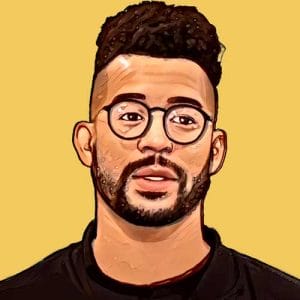
Toren says even from his early days at The Harley School (he started in Kindergarten), he was surrounded by greatness: the teachers, the staff, the facilities, other students, especially his classmates. “Everyone in my class was smart and gifted, and it was hard not to want that for yourself. The teachers were expecting greatness from all of us, and you wanted to fulfill that expectation.” During his 13 years at Harley, he says so many teachers supported and encouraged him. Teachers like Jay Stetzer, P ’88, ’91, GP ’20, ’26, (Lower School Performing Arts, 1971 to 2018) Maura Allen, P ’91, ’92, GP ’20, ’26 (Lower School Art, 1981 to 1999), Margaret Tolhurst, P ’12, ’15 (Lower School, 1992 to present), Barbara Willard (MS English, 1990 to 2006), Kirsten Allen Reader ’90, P ’20, ’26 (Middle School English, 1999 to 2018 and Director of Enrollment, 2018 to present), Doug Gilbert ’87, P ’21, ’24, ’27 (Middle School History, 1999 to present), Bill Schara (US History, 1997 to 2021), Jessica Densmore (Latin, 1997 to present), Amy Colosimo, P ’23, ’23 (French, 1999 to present), and Bob Kane (English and Hospice, 2003 to 2013).
His Harley Hospice experience with Mr. Kane was especially impactful. Before he took the Hospice class, he had never thought about mortality, and when he befriended his first hospice patient, it never occurred to him that the relationship they were building would soon change. It was a revealing situation because when the patient died, it was a total surprise, but Toren learned quickly how to handle the situation. The hospice experience was life-changing and set him up to handle some tough situations in the future.
After Harley, Toren went to Wells College, and that first year was rough. He felt that Harley had prepared him, but he felt a little overly confident at college and didn’t take his classes seriously. After a poor first semester, the Dean of Students called him into his office and asked, “What do you want to do while you are here?” Toren boldly stated that he wanted to be at the top of his class, study abroad, and graduate on time. He said they laughed at him. He reminded himself, “My teachers at Harley told me that I can do anything I set my mind to, and I am not going to let them down.” At that moment, he set out to accomplish every one of those goals, and he did.
Toren graduated from Wells with a bachelor’s degree in creative writing in 2010, during a recession, when it was impossible to find a job. He sent out over three hundred resumes and didn’t hear back from anyone. He was surrounded by friends starting their careers and busy making plans; he felt like he had nothing. He needed to make money, so he was doing odd jobs and took up boxing and mixed martial arts fighting. After four years of piecing his life together, he eventually heard from two places — and one of them changed his whole outlook on life, Community Place of Greater Rochester. His work at Community Place, a “nonprofit agency founded on the belief that everyone should enjoy the same health, economic, and social opportunities no matter who they are or where they live,” made an impact on who he is today.
At Community Place, Toren was hired to teach at-risk youth, and his first job was preparing students for the “Task Exam” (a general education degree). He had never been a teacher, but from his time at Harley, he knew what great teaching looked like, though his initial experience at Community Place was “culture shock.” Instead of building students up and telling them what they could achieve, some of the teachers squashed ideas and told kids what they couldn’t do. He planned to change that and started copying what he learned from his teachers at Harley. He was an encouraging, positive role model and really connected with his kids. He knew what these students were capable of, and he knew some of their homelife situations, so they needed all the support they could get.
Toren stayed at Community Place for three years. He said it was a great job and gave him a desire to help his community, but says, “I had to be true to myself. I know what I can do, and my goals were bigger than this. I needed to start going after the biggest goal possible.” He decided to leave and switch his focus to marketing, but still planned to do community outreach and be a resource for at-risk youth, but in his own way.
After Community Place, he started working at a local marketing firm, Dixon Schwabl, then Martino Flynn, followed by a local start-up. He was feeling good, he had a solid job doing what he loved, he was married and thinking about a family, and then in March 2020, the pandemic hit. He lost his job and, on top of that, Toren, an undefeated amateur boxer on the Golden Glove track, had to put his aspirations to be a part of the Olympic boxing team on hold. Despite all this, he saw an opportunity, and the same day he lost his job, he decided to start his own marketing firm. He notified his clients of his departure, and they all decided to follow him. Kesa Content Design & Strategy was born.
His new business endeavor was off to a prodigious start, but Toren says he was outside his skill set for one of the first projects he was hired to do. Knowing he could do anything, he told his new client, “No problem!” For the next 18 hours, through trial and error, he learned a new program, created the requested design, and followed his mantra, “Fake it while I make it!” He continues to teach himself new kills in areas he has never been exposed to. He admits this muscle was developed while at Harley.
His work has come full circle. He is still connected with Community Place, mentoring students who need professional development help. Kesa recently celebrated its one-year anniversary, and he’s learned that, especially during this pandemic time, businesses can come and go in a heartbeat. He doesn’t want to wait before giving back. To celebrate the anniversary, he created the Charles Douglas Award, named after his father, and this year he gifted an Adrien Jules Custom Clothier interview suit to one of the students he mentors. Toren says he didn’t buy his first suit until he was in his late 20s, and he knows when you don’t have money for a nice suit, it’s hard to make a good first impression at an interview. Toren plans to mentor more students and gift more suits as long as he is able.
Toren is grateful to his parents and the sacrifices they made to send his sister Cara ’02 and him to Harley. He says that any one of the kids that he has worked with over the years could have been him and done great things if they were given the same opportunity. He feels he was the “undeserving beneficiary” of the hard work of his parents to provide his sister and him a Harley education.
Toren says he was not the easiest student at Harley and that teachers must have worried about him. He says they gave much time and worked hard to make sure he succeeded. “Everyone was generous at Harley—parents, teachers, fellow students. I wish I’d been more grateful while here.” He says if he had not gone to Harley, his story would be totally different. He is aware that kids experience some unbelievably negative situations in their lives, and he plans to give back ten-fold.
If Toren were to give advice to today’s students, he would say, “Don’t work too hard on the figuring out of things.” He says those high school years (ages 14 to 18) are kind of nebulous when it comes to figuring out your identity and that’s ok, they’re supposed to be. He also says that you need to close the gap on things that seem impossible and stick with people who encourage you, not distract you from your goals. He says those distractors should be put on a shelf. You need to trust yourself and your intuition, and you’ll end up liking the person you become.
 Toren says even from his early days at The Harley School (he started in Kindergarten), he was surrounded by greatness: the teachers, the staff, the facilities, other students, especially his classmates. “Everyone in my class was smart and gifted, and it was hard not to want that for yourself. The teachers were expecting greatness from all of us, and you wanted to fulfill that expectation.” During his 13 years at Harley, he says so many teachers supported and encouraged him. Teachers like Jay Stetzer, P ’88, ’91, GP ’20, ’26, (Lower School Performing Arts, 1971 to 2018) Maura Allen, P ’91, ’92, GP ’20, ’26 (Lower School Art, 1981 to 1999), Margaret Tolhurst, P ’12, ’15 (Lower School, 1992 to present), Barbara Willard (MS English, 1990 to 2006), Kirsten Allen Reader ’90, P ’20, ’26 (Middle School English, 1999 to 2018 and Director of Enrollment, 2018 to present), Doug Gilbert ’87, P ’21, ’24, ’27 (Middle School History, 1999 to present), Bill Schara (US History, 1997 to 2021), Jessica Densmore (Latin, 1997 to present), Amy Colosimo, P ’23, ’23 (French, 1999 to present), and Bob Kane (English and Hospice, 2003 to 2013).
Toren says even from his early days at The Harley School (he started in Kindergarten), he was surrounded by greatness: the teachers, the staff, the facilities, other students, especially his classmates. “Everyone in my class was smart and gifted, and it was hard not to want that for yourself. The teachers were expecting greatness from all of us, and you wanted to fulfill that expectation.” During his 13 years at Harley, he says so many teachers supported and encouraged him. Teachers like Jay Stetzer, P ’88, ’91, GP ’20, ’26, (Lower School Performing Arts, 1971 to 2018) Maura Allen, P ’91, ’92, GP ’20, ’26 (Lower School Art, 1981 to 1999), Margaret Tolhurst, P ’12, ’15 (Lower School, 1992 to present), Barbara Willard (MS English, 1990 to 2006), Kirsten Allen Reader ’90, P ’20, ’26 (Middle School English, 1999 to 2018 and Director of Enrollment, 2018 to present), Doug Gilbert ’87, P ’21, ’24, ’27 (Middle School History, 1999 to present), Bill Schara (US History, 1997 to 2021), Jessica Densmore (Latin, 1997 to present), Amy Colosimo, P ’23, ’23 (French, 1999 to present), and Bob Kane (English and Hospice, 2003 to 2013).
His Harley Hospice experience with Mr. Kane was especially impactful. Before he took the Hospice class, he had never thought about mortality, and when he befriended his first hospice patient, it never occurred to him that the relationship they were building would soon change. It was a revealing situation because when the patient died, it was a total surprise, but Toren learned quickly how to handle the situation. The hospice experience was life-changing and set him up to handle some tough situations in the future.
After Harley, Toren went to Wells College, and that first year was rough. He felt that Harley had prepared him, but he felt a little overly confident at college and didn’t take his classes seriously. After a poor first semester, the Dean of Students called him into his office and asked, “What do you want to do while you are here?” Toren boldly stated that he wanted to be at the top of his class, study abroad, and graduate on time. He said they laughed at him. He reminded himself, “My teachers at Harley told me that I can do anything I set my mind to, and I am not going to let them down.” At that moment, he set out to accomplish every one of those goals, and he did.
Toren graduated from Wells with a bachelor’s degree in creative writing in 2010, during a recession, when it was impossible to find a job. He sent out over three hundred resumes and didn’t hear back from anyone. He was surrounded by friends starting their careers and busy making plans; he felt like he had nothing. He needed to make money, so he was doing odd jobs and took up boxing and mixed martial arts fighting. After four years of piecing his life together, he eventually heard from two places — and one of them changed his whole outlook on life, Community Place of Greater Rochester. His work at Community Place, a “nonprofit agency founded on the belief that everyone should enjoy the same health, economic, and social opportunities no matter who they are or where they live,” made an impact on who he is today.
At Community Place, Toren was hired to teach at-risk youth, and his first job was preparing students for the “Task Exam” (a general education degree). He had never been a teacher, but from his time at Harley, he knew what great teaching looked like, though his initial experience at Community Place was “culture shock.” Instead of building students up and telling them what they could achieve, some of the teachers squashed ideas and told kids what they couldn’t do. He planned to change that and started copying what he learned from his teachers at Harley. He was an encouraging, positive role model and really connected with his kids. He knew what these students were capable of, and he knew some of their homelife situations, so they needed all the support they could get.
Toren stayed at Community Place for three years. He said it was a great job and gave him a desire to help his community, but says, “I had to be true to myself. I know what I can do, and my goals were bigger than this. I needed to start going after the biggest goal possible.” He decided to leave and switch his focus to marketing, but still planned to do community outreach and be a resource for at-risk youth, but in his own way.
After Community Place, he started working at a local marketing firm, Dixon Schwabl, then Martino Flynn, followed by a local start-up. He was feeling good, he had a solid job doing what he loved, he was married and thinking about a family, and then in March 2020, the pandemic hit. He lost his job and, on top of that, Toren, an undefeated amateur boxer on the Golden Glove track, had to put his aspirations to be a part of the Olympic boxing team on hold. Despite all this, he saw an opportunity, and the same day he lost his job, he decided to start his own marketing firm. He notified his clients of his departure, and they all decided to follow him. Kesa Content Design & Strategy was born.
His new business endeavor was off to a prodigious start, but Toren says he was outside his skill set for one of the first projects he was hired to do. Knowing he could do anything, he told his new client, “No problem!” For the next 18 hours, through trial and error, he learned a new program, created the requested design, and followed his mantra, “Fake it while I make it!” He continues to teach himself new kills in areas he has never been exposed to. He admits this muscle was developed while at Harley.
His work has come full circle. He is still connected with Community Place, mentoring students who need professional development help. Kesa recently celebrated its one-year anniversary, and he’s learned that, especially during this pandemic time, businesses can come and go in a heartbeat. He doesn’t want to wait before giving back. To celebrate the anniversary, he created the Charles Douglas Award, named after his father, and this year he gifted an Adrien Jules Custom Clothier interview suit to one of the students he mentors. Toren says he didn’t buy his first suit until he was in his late 20s, and he knows when you don’t have money for a nice suit, it’s hard to make a good first impression at an interview. Toren plans to mentor more students and gift more suits as long as he is able.
Toren is grateful to his parents and the sacrifices they made to send his sister Cara ’02 and him to Harley. He says that any one of the kids that he has worked with over the years could have been him and done great things if they were given the same opportunity. He feels he was the “undeserving beneficiary” of the hard work of his parents to provide his sister and him a Harley education.
Toren says he was not the easiest student at Harley and that teachers must have worried about him. He says they gave much time and worked hard to make sure he succeeded. “Everyone was generous at Harley—parents, teachers, fellow students. I wish I’d been more grateful while here.” He says if he had not gone to Harley, his story would be totally different. He is aware that kids experience some unbelievably negative situations in their lives, and he plans to give back ten-fold.
If Toren were to give advice to today’s students, he would say, “Don’t work too hard on the figuring out of things.” He says those high school years (ages 14 to 18) are kind of nebulous when it comes to figuring out your identity and that’s ok, they’re supposed to be. He also says that you need to close the gap on things that seem impossible and stick with people who encourage you, not distract you from your goals. He says those distractors should be put on a shelf. You need to trust yourself and your intuition, and you’ll end up liking the person you become.

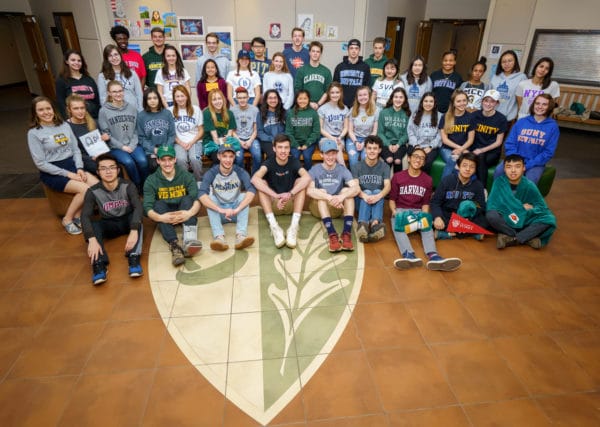 Harley’s Approach to College Counseling
Harley’s Approach to College Counseling “Club Rush” is an afternoon every fall in the Upper School when students have the chance to sign up for clubs for the year, and each year it is very different because new clubs are created based on student initiative and enthusiasm.
“Club Rush” is an afternoon every fall in the Upper School when students have the chance to sign up for clubs for the year, and each year it is very different because new clubs are created based on student initiative and enthusiasm. Each and every year, students at The Harley School participate in HAC Athletics, and their success continues to be impressive, both as students and athletes. Our athletic program is an integral part of Harley, teaching student-athletes invaluable lessons about teamwork, time management, persistence, and competition. Our program allows them to develop physically, mentally, socially, and emotionally as they represent their school on and off the field. They grow, mature, and work hard to be the best teammate they can, while creating lifelong memories with teammates who often remain friends for life.
Each and every year, students at The Harley School participate in HAC Athletics, and their success continues to be impressive, both as students and athletes. Our athletic program is an integral part of Harley, teaching student-athletes invaluable lessons about teamwork, time management, persistence, and competition. Our program allows them to develop physically, mentally, socially, and emotionally as they represent their school on and off the field. They grow, mature, and work hard to be the best teammate they can, while creating lifelong memories with teammates who often remain friends for life. 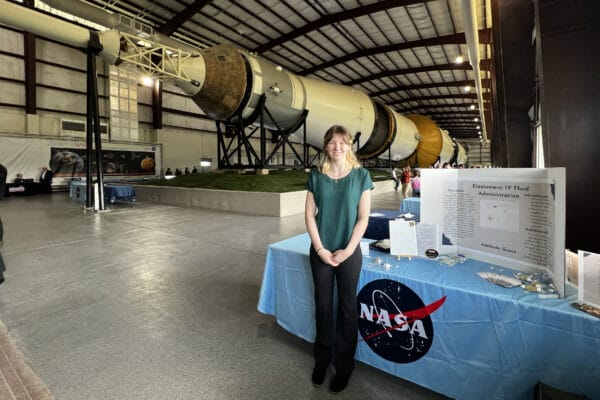 Our Upper School is filled with formal and informal opportunities for students to take on leadership roles. Whether following passions or learning new skills, student-driven opportunities take many shapes.
Our Upper School is filled with formal and informal opportunities for students to take on leadership roles. Whether following passions or learning new skills, student-driven opportunities take many shapes.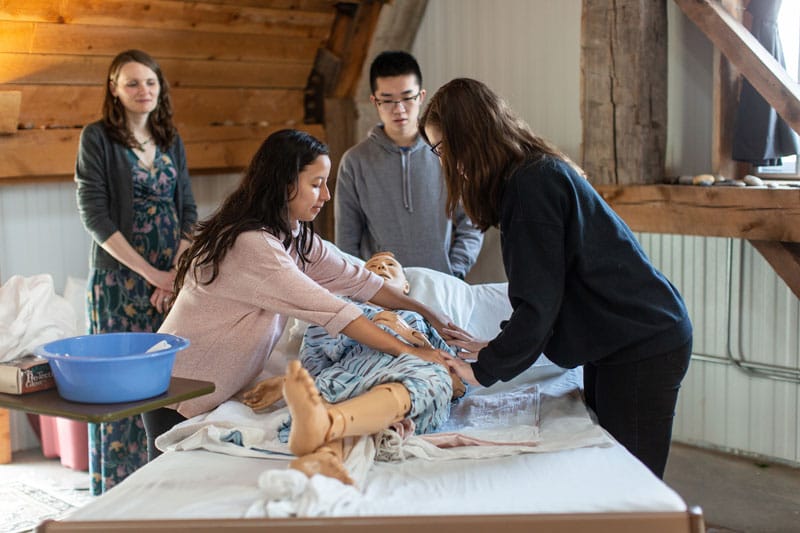 Unlike this class, death is not an elective. Although it is one of two universal human experiences, our culture often ignores, denies, or misconstrues the true nature of death and dying. What happens when we bear witness to this natural process in the cycle of life and develop our ability to be fully present with others when they need us more than ever? It has the potential to change us deeply and fundamentally while shining a brilliant light on the path of our own lives.
Unlike this class, death is not an elective. Although it is one of two universal human experiences, our culture often ignores, denies, or misconstrues the true nature of death and dying. What happens when we bear witness to this natural process in the cycle of life and develop our ability to be fully present with others when they need us more than ever? It has the potential to change us deeply and fundamentally while shining a brilliant light on the path of our own lives.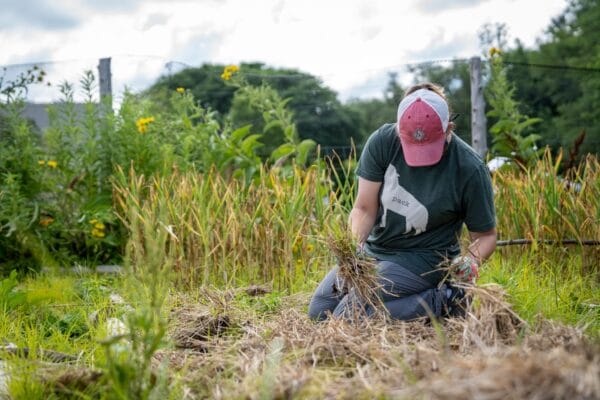 This program utilizes environmentally-focused approaches to education and hands-on learning in order to foster the next generation of leaders through a lens of sustainability and problem-solving.
This program utilizes environmentally-focused approaches to education and hands-on learning in order to foster the next generation of leaders through a lens of sustainability and problem-solving.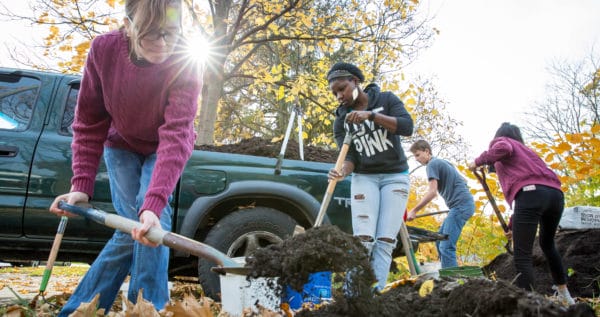 At Harley, our students learn how to evaluate social systems in order to identify complex problems in society through a lens of social justice. They take a hands-on approach to working for a fair, equitable society by researching, exploring and evaluating different perspectives, and offering solutions—both theoretical and practical.
At Harley, our students learn how to evaluate social systems in order to identify complex problems in society through a lens of social justice. They take a hands-on approach to working for a fair, equitable society by researching, exploring and evaluating different perspectives, and offering solutions—both theoretical and practical.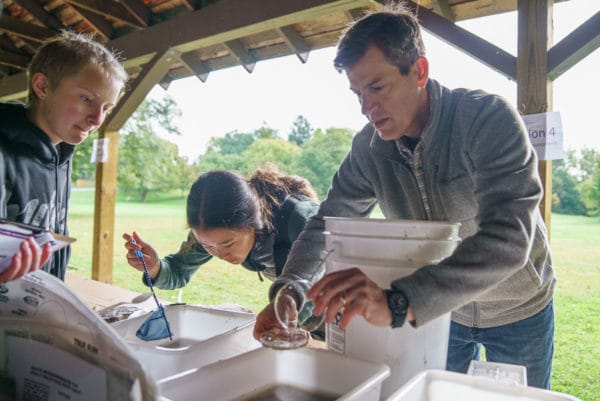 Students may create independent studies with supervising teachers throughout their Upper School experience or, during Grade 12, they can design Capstone projects—intensive collaborations with Harley faculty and off-campus mentors—involving rigorous academic study and culminating in public presentations.
Students may create independent studies with supervising teachers throughout their Upper School experience or, during Grade 12, they can design Capstone projects—intensive collaborations with Harley faculty and off-campus mentors—involving rigorous academic study and culminating in public presentations. 